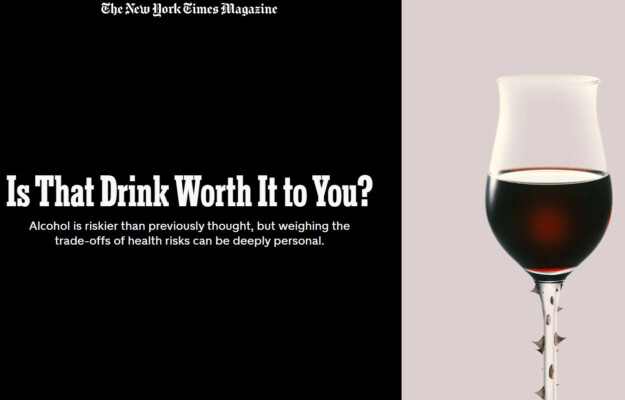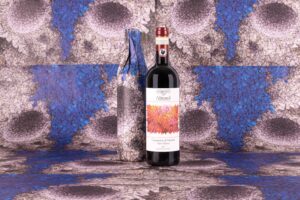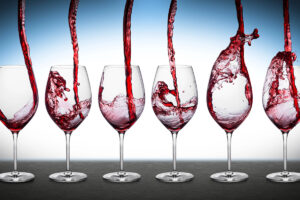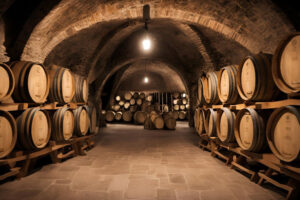A glass of wine that instead of a stem has a rose stem with its thorns, a glass of what could be a whiskey with the rim like a metal saw, and a headline that insinuates doubt: “Is That Drink Worth It to You? Alcohol is riskier than previously thought, but weighing the trade-offs of health risks can be deeply personal”. And then, however, a sided article, quite blatantly, but much more balanced (as is often the case), where it is reaffirmed, in the writer’s view, that there is no such thing as safe, risk-free alcohol consumption, but also that the issue of risk itself needs to be clarified, contextualized and explained well, because if we talk about “increased risk” starting from a risk that is low anyway, the increase, logically, will also be contained. And that much, in the end, depends on personal assessments of the balance between risk itself, pleasure and the social function of indulging in a drink, as of many other products and behaviors. This is the extreme summary of an article that appeared, in recent days, in “The New York Times”, one of the most widely read newspapers in the world and considered among the most authoritative, by Susan Dominus, formerly on the staff of the newspaper that won the Pulitzer Prize “or public service” for an investigation of sexual abuse in the workplace in 2018.
An article that captures the ongoing change in consumption, and especially well describes the very strong impact of the anti-alcohol campaigns underway more or less explicitly a bit around the world, but also of the consumption guidelines that various Governments have rewritten, as in Canada, where a consumption of one or two drinks per week is defined as “low risk” and a consumption of three to six drinks as “moderate risk”, but where it is stipulated that there is no such thing as alcohol consumption without possible health risks, no matter how moderate, or that they are rewriting, as in the U.S., where they seem to be going in the same direction. “In the early 1990s, a number of leading researchers were promoting, and the media helped spread, the idea that moderate alcohol consumption - for women, one glass per evening; for men, two - was linked to increased longevity. The cause of this association was unclear, but researchers theorized that red wine might have anti-inflammatory properties that extended life and protected cardiovascular health. Leading health organizations and some physicians consistently warned that alcohol consumption was linked to an increased risk of cancer, but the dominant message moderate drinkers heard was one of reassurance and encouragement”, Dominus writes among others. Emphasizing how this, for many people, is changing, and that the message that drinking even a single glass is associated with health risks, and in particular with the risk of developing cancer, as also fixed on the labels of all alcoholic beverages from Ireland, as we have reported in the past and “case history” also cited by “The New York Times”, has now passed into public opinion.
But the article also asks a fundamental question: “No amount of alcohol is good for you, that much is clear. But one can reasonably ask: How much is bad for you? The information we receive about health risks often glosses over the specifics of a person’s actual risk, as if they were not details worth knowing”. And part of the answer lies in the words of Tim Stockwell, a scientist at the Canadian Institute for Substance Use Research and, explains the article in “The New York Times”, among the most influential names in the new Canadian guidelines, and once among the proponents of the benefits of moderate wine consumption, before changing his mind after reviewing some of the studies on the subject. “Stockwell”, writes Susan Dominus, “illustrated to me the risks for a woman of my age: if I indulged in, say, six drinks a week, she said, I increased my risk of dying in my lifetime from alcohol-related causes by 10 times, compared with someone who drank only one or two drinks a week. This jump seemed worrisome until Stockwell put it in context. If I consumed six drinks a week, my risk of dying from an alcohol-related cause was still, from any perspective, low on average: only 1%. And if my all-cause mortality risk was quite low - Stockwell assured me that at age 53 it was - then any additional risk would clearly be very low”. And again, reasoning by statistical averages, to be taken for what they are because by the scientist’s own admission it is impossible to determine numerically the impact of alcohol consumption on an individual person, Stockwell argues that drinking one to two drinks a week equals one week less of life, a loss of longevity that would rise to two and a half months if seven alcoholic drinks a week are drunk, while those who get up to five drinks a day would lose more than two years of life. There is also no shortage of considerations on the issue of individual versus collective risks, which, however, mixes the public health harms (and burdens) not only from alcohol-related diseases, but also from violent behavior, accidents, and so on, associated, however, with abuse, and not with consumption tout court.
An important article, however, in an important newspaper, which takes a good picture of the change taking place in attitudes toward alcohol and drinking. With an increasingly “Manichean” division, as is the case in many aspects of life, and as is also evident from user comments to the article on Facebook. Among those who call alcohol, without half words, poison (“poison”), those who say they will never have another drink, those who say they will never give up their favorite drink, those who still point out that there are so many studies that, instead, support the goodness, for health, of moderate drinking, those who point out that, to hurt health, there are so many other factors such as stress, traffic, smog and so on, today less in the spotlight.
Copyright © 2000/2026
Contatti: info@winenews.it
Seguici anche su Twitter: @WineNewsIt
Seguici anche su Facebook: @winenewsit
Questo articolo è tratto dall'archivio di WineNews - Tutti i diritti riservati - Copyright © 2000/2026








































































































































































































